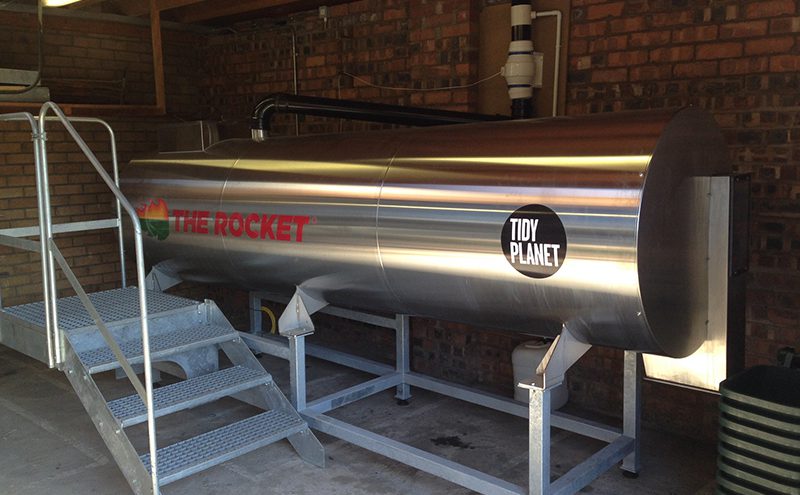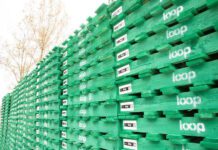
Dundee and Angus College has invested in a second of Tidy Planet’s Rocket Composters for its Arbroath Campus, after successfully composting over 70 tonnes of food waste in the last three years at its Kingsway site.
The college itself spans three campuses – Kingsway, Gardyne and Arbroath – and began its sustainability journey in 2015 when it switched to Vegware compostable catering consumables, in an effort to reduce single-use plastics. This packaging shift drove the college to seek technology that would allow it to introduce a self-directed and closed-loop food waste management solution.
In 2015, integrated shredding and dewatering systems were installed across the three locations, as a way for the college to pre-treat its kitchen waste. The resulting feed material – made from compostable tableware and food waste – has since been transported from the outer two sites to the college’s Kingsway Campus, and then blended with green wastes to provide the ideal mix for its first A900 Rocket Composter.
The A900 Rocket is capable of processing up to one tonne of the college’s food wastes per week, and the resulting nutrient-rich soil resource is retained – primarily within the horticultural department at Kingsway – for weed suppression or potting purposes.
Commenting on the rationale behind the second investment, Jackie Beresford, environmental officer at Dundee and Angus College, said: “We’re always looking for ways to act ‘greener’, so given the success of the first machine, it was a logical decision to invest in another.
“The additional unit not only ensures we have enough capacity to treat all our food wastes, but it also allows us to compost all year round.
“Therefore, we are not only cutting out waste transportation costs and further decreasing our carbon emissions, but students are benefitting from having a real-time composting process at their fingertips.”
Three years on from the initial equipment’s installation, commercial and educational institutions from across the globe have contacted Dundee and Angus about the innovative approach to reducing their food-waste footprint and to learn more about this waste-to-resource technology.
Huw Crampton, sales manager at Tidy Planet, added: “The College’s small-scale composting example is a great working illustration of the benefits of closing the organic waste loop – effectively demonstrating how one of the most commonly produced wastes can easily be recycled at source.
“And with the worldwide shift away from single-use plastics, it’s a solution that an increasing number of organisations are looking into.”
The college’s innovative approach to food waste management has not gone unrecognised in the environmental sector, having recently scooped CIWM’s ‘Best Food Waste Initiative’ award in October – as well as receiving further accolades from Scottish Resources and the Environmental Association for Universities and Colleges, recognising its commitment to sustainability and resource security.
Pennsylvania-based Swarthmore College is the latest institution to look toward Dundee and Angus for ways to boost its environmental commitment.
Currently producing over 40 tonnes of food waste per year, Swarthmore sends its food wastes off-site for composting, but with the goal of going plastic free with compostable tableware, the need for an on-site solution is a key part of its future Zero-Waste-to-Landfill strategy.
Swarthmore’s sustainability program manager, Melissa Tier, recently visited the site and concluded: “In addition to reducing our overall waste quantities, we’re working to make as much of it compostable as possible – with an end goal of no waste going to landfill or for incineration.
“Seeing the in-vessel-composting system working so well at Dundee and Angus was very encouraging – we’re excited to see how this method could be replicated in the US, to help us reach our closed loop goals.”







